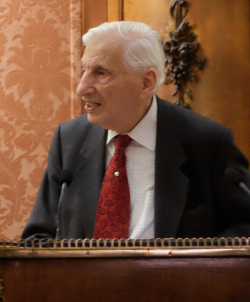President's Corner: Moving forward with Peter Jost’s legacy for a green, clean, and sustainable future
date: 30.07.2019
Prof. H. Peter Jost, the founding father of modern-day tribology and the first President of the International Tribology Council (ITC), passed away on June 7, 2016. This was certainly a very sad day for the entire tribology community. He tirelessly carried the leadership mantle of ITC until his passing and was, without any doubt, responsible for bringing the world tribology community together.
Peter was also the driving force behind the highly acclaimed Jost Report, in which the word “tribology” was first coined with a clear-cut definition: “the science and technology of interacting surfaces in relative motion and of the practices related thereto”. Beyond its scientific meaning, Peter was an outspoken advocate of tribology’s economic and ecological benefits to humanity. On his many keynote addresses at international forums, he would always argue that tribology by its very definition means ”green”. In his speech to the attendees of the 4th World Tribology Congress in Kyoto, Japan, in 2009, he very elegantly explained that “mainly because, the transfer of force between two surfaces in relative motion involves friction, and friction leads to the dissipation of energy and to wear, the avoidance or diminution of which are indeed the key objectives of tribology”. Realizing its very complex and multidisciplinary nature, Peter was also very much aware of the needs for increased worldwide collaboration among tribologists as this was one of key reasons for the creation of ITC.
Late Prof. H. Peter Jost; the founding father of modern-day tribology and the first President of the International Tribology Council
Undoubtedly, his far-sighted messages from the past resonate much louder these days as the sustainability of an ecologically diverse and habitable planet for generations to come is increasingly becoming questionable. Until now, we have enjoyed a very generous and diverse planet, where life has existed for millions of years. However, things have started to change in recent decades due to much accelerated uses of non-renewable fossil fuels to meet our ever-increasing energy needs. Unfortunately, these have burdened us with greatly accelerated greenhouse gas (GHG) emission, which is now suspected as the key reason for worldwide climate change or disruptions. So, in reality, all of us are to blame for tipping the delicate balance of our ecosystem and jeopardizing the livelihood of all living species on this planet.
As tribologists, how can we help in stopping or even reversing this trend? As Peter pointed out a long time ago, we must continue to develop and implement more effective tribological technologies and lubrication practices that can reduce GHG emissions and, at the same time, increase the efficiency and durability of future mechanical systems. In fact, the Committee who put together the Jost report for the British Government in 1966 very clearly documented the true economic and ecological benefits of tribology when properly practiced by industry. There is no question that we owe our current lifestyle to many moving mechanical systems used in transportation, manufacturing, mining, oil and gas, power generation, and so on. Thanks to advanced tribological principles and very durable materials and effective lubricants that we have all developed over the years, these systems function incredibly well (think of the cars that we drive every day). Despite all these great advances, energy and material losses due to friction and wear in moving mechanical systems still account for huge economic and environmental burdens. In fact, a recent comprehensive study estimated that about 23% of all energy produced in this world is still consumed by friction and wear-related losses. Even a very small improvement in the friction and wear of future machine components can globally save enormous amounts of energy, reduce emissions, and increase system reliability, thus ultimately benefiting society.
Among all the planets in our solar system and beyond, ours is the only one where life has existed in multifarious forms for so long. The big question is: how long can we keep it that way? There is no doubt that our dependence on advanced mechanical devices that propel our modern lifestyle will continue to increase in coming years. However, while embracing such an increasingly more mobile and industrialized world, we must remember to ensure that these machines are far more efficient, durable, and green. In his closing remark at the 4th World Tribology Congress, Peter stated that “The cause of tribology is indeed a worthy cause for all tribologists and their societies to pursue, as it will help tribology to play its rightful part, not only for the benefit of science and technology, but much more importantly, for the benefit of mankind”. Undoubtedly, he was a legend and visionary leader of our time. Thanks to many dedicated scientists, engineers, and specialists of our tribology field, we the tribologists will stay the course and move forward with Peter’s legacy for a green, clean, and sustainable future.

